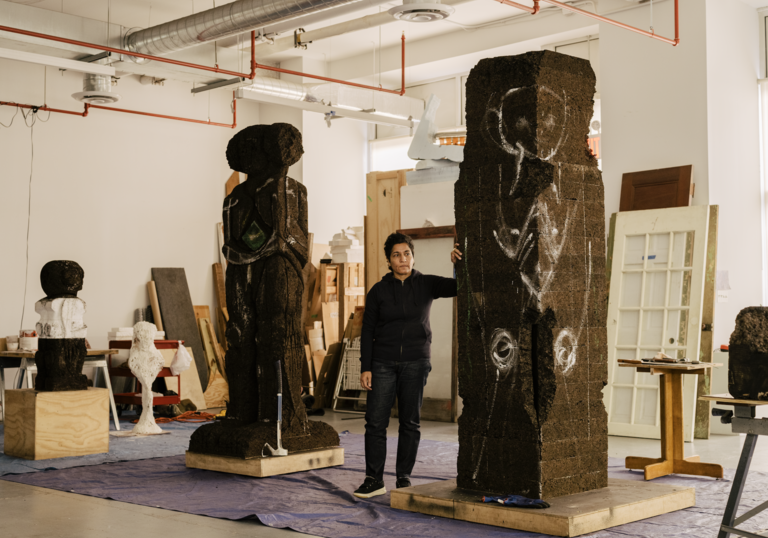One of the most significant European sculptors of the 20th century, Alberto Giacometti is known for his distinctive, elongated sculptures which experiment with the human form. Responding to the pain and devastation caused by the Second World War, his works proposed a new perspective on humanity and the collective psyche.
Encounters, a series of three groundbreaking exhibitions taking place over the course of a year, pairs his work with contemporary artists, creating a dialogue across time. The inaugural exhibition brings together the work of Alberto Giacometti and Huma Bhabha, an artist known for her raw, powerful sculptures that explore themes of war, displacement, and the human condition. Born in Karachi, Pakistan, and based in Poughkeepsie, New York, Bhabha’s sculptural language fuses ancient and futuristic aesthetics. Working with materials like clay, cork, Styrofoam, and found objects, her figures evoke both ruin and resilience, much like Giacometti’s forms shaped by the trauma of war. In this exhibition, Bhabha presents a selection of works from 2003 to the present, displayed alongside Giacometti’s sculptures to highlight the resonances between their practices – both in materiality and in their shared engagement with the fractured, vulnerable human form.
We talked to Bhabha about Giacometti’s impact on her work, her artistic process, and what it means to present her sculptures in conversation with his.
Could you tell us about your first encounter with Alberto Giacometti’s work? What impact did it have on you?
The first time I encountered Giacometti’s work in person was during a trip to the Peggy Guggenheim Museum in Venice where I saw Walking Woman, 1936 for the first time. I also saw a retrospective at the Musée des beaux-arts de Montréal (MBAM) in 1998 and it really affected me. I was making sculpture, but hadn’t started to work with clay yet.
Do you feel Giacometti’s work has influenced your own practice? Can you tell us how?
There has definitely been an influence. I see a lot of connections in the physical process of creating my work. I use my hands and have a direct connection to the materials – it’s a very old fashioned way of working. There is also a sensibility and approach that I’ve learned from him, an obsession with certain details and parts of the body.
What is it about Giacometti’s practice that you’re particularly responding to with this exhibition?
[Barbican Head of Visual Arts] Shanay Jhaveri invited me to present my work alongside the work of Giacometti, the first in a series of “Encounters” at the museum. His vision has led us to select works that show the potential connections with Giacometti’s sculptures. There are a lot of connections to the subject matter in our work and also the materiality, which is very important to me. I am also responding to the effects of militarism and forever wars, as Giacometti was confronting the human suffering and the trauma of the two world wars.
Encounters: Giacometti x Huma Bhabha, 8 May–10 Aug, Level 2

